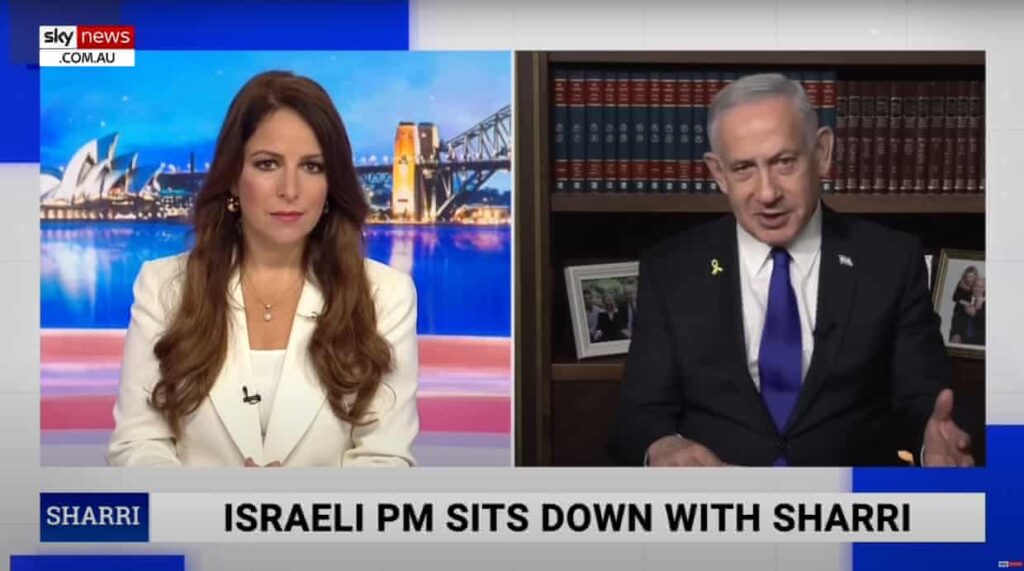
Israeli Prime Minister Benjamin Netanyahu faced tough questions during his recent interview with Sky News Australia anchor Sharri Markson. The conversation, which aired on Thursday night, revolved around Israel’s ongoing conflict with Hamas and the perceptions surrounding it. Netanyahu utilized the platform to reiterate his government’s stance, framing Hamas as a modern-day equivalent of Nazi Germany and calling out perceived global complacency towards its actions.
Markson opened the dialogue by referencing the historical context of appeasement in the lead-up to World War II, specifically querying Netanyahu about his views on how leaders, including Australian Prime Minister Anthony Albanese, are responding to Hamas. “Is this word appeasement a direct reference to how Europe dealt with Hitler in the 1930s?” Markson asked. Netanyahu did not hesitate, stating, “It’s appeasement, pure and simple.”
The interview continued with Markson addressing accusations against Israel regarding humanitarian issues in Gaza. She asked about claims that Israel is deliberately starving Palestinian children and conducting genocide. Netanyahu dismissed these allegations, asserting, “It’s the same lies that were levelled at the Jewish people in the Middle Ages.” He expressed confidence that Israel would succeed in both the propaganda battle and the physical conflict.
While Netanyahu’s rhetoric resonated within the confines of the interview, it raised questions about the effectiveness of such exclusive media engagements in fostering genuine dialogue. Critics often point out that interviews like this can serve more as platforms for political talking points than for substantive discussion.
In a related context of Australian media, mining magnate Gina Rinehart has stirred controversy with her column in a special liftout for the Bush Summit, sponsored by her companies, including Hancock Prospecting. Rinehart’s piece paints a bleak future tied to environmental regulations, claiming that the Royal Flying Doctor Service may struggle to operate due to restrictions on emissions.
Rinehart’s narrative highlights the potential adverse effects of climate policies on Australia’s agricultural sector. She argues that farmers may have to raise food prices, leading to a reliance on inferior imports from regions less committed to environmental standards. This juxtaposition of dire warnings against the backdrop of climate change-related news, such as droughts and floods, underscores the ongoing debate over the balance between economic growth and environmental responsibility.
Meanwhile, supermarket manager JP Drake has gained attention for his controversial remarks regarding the Australian workforce. On a recent podcast, he claimed he had to “import” workers from Vanuatu despite a reported 23% unemployment rate in his area, attributing the issue to welfare dependencies. However, local statistics indicate a significantly lower unemployment rate of 9.3% in the City of Playford, where Drake operates.
Drake’s comments about hiring foreign workers amid a local unemployment rate have sparked discussions about the realities of the job market and the nuances of employment statistics in Australia. His statements have drawn media interest, particularly given his history of outspoken opinions on various social issues, including criticisms of renewable energy initiatives and minimum wage laws.
In another development, former MP George Christensen announced the launch of a new media platform, Command Post, which he describes as an “anti-regime” outlet aimed at countering what he perceives as the decline of Australian democracy. Christensen’s platform promises to provide “tactical intel” and a forum for supporters of conservative values.
The emergence of such platforms reflects a growing trend where political figures leverage alternative media to engage their base directly, bypassing traditional news outlets. This approach raises questions about the future of political discourse and the role of media in shaping public opinion.
As discussions around media representation and political narratives evolve, the interplay between public statements from leaders like Netanyahu and Rinehart, and the responses from various sectors of society, will continue to shape the landscape of Australian and international politics.







